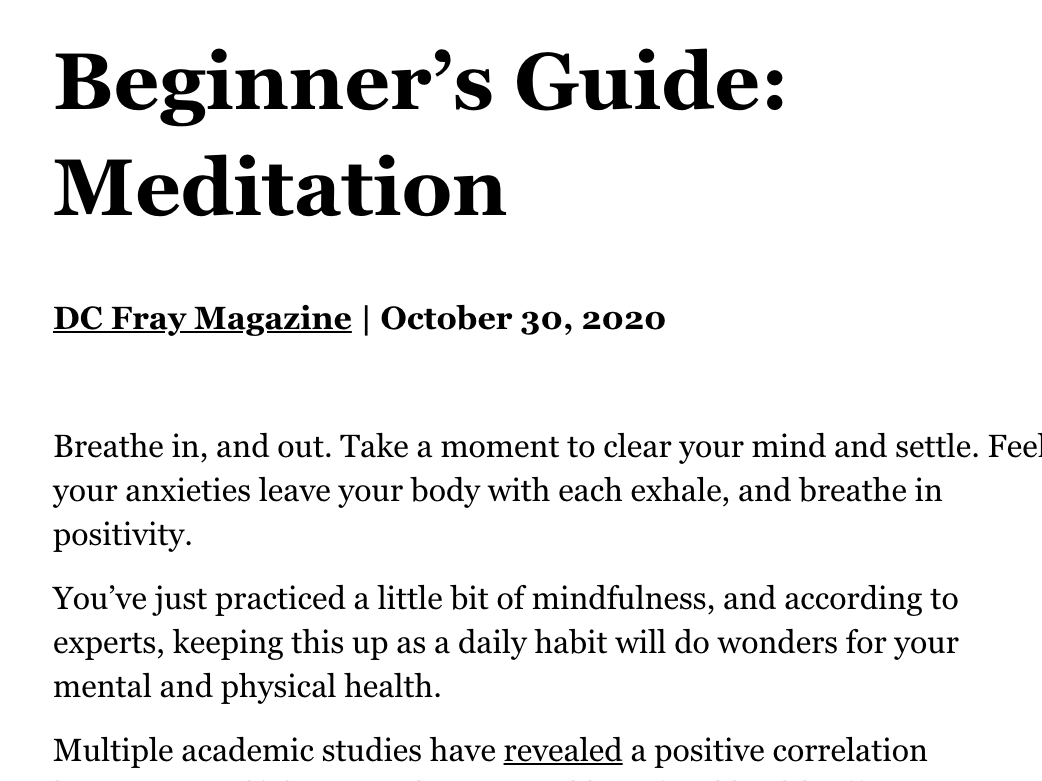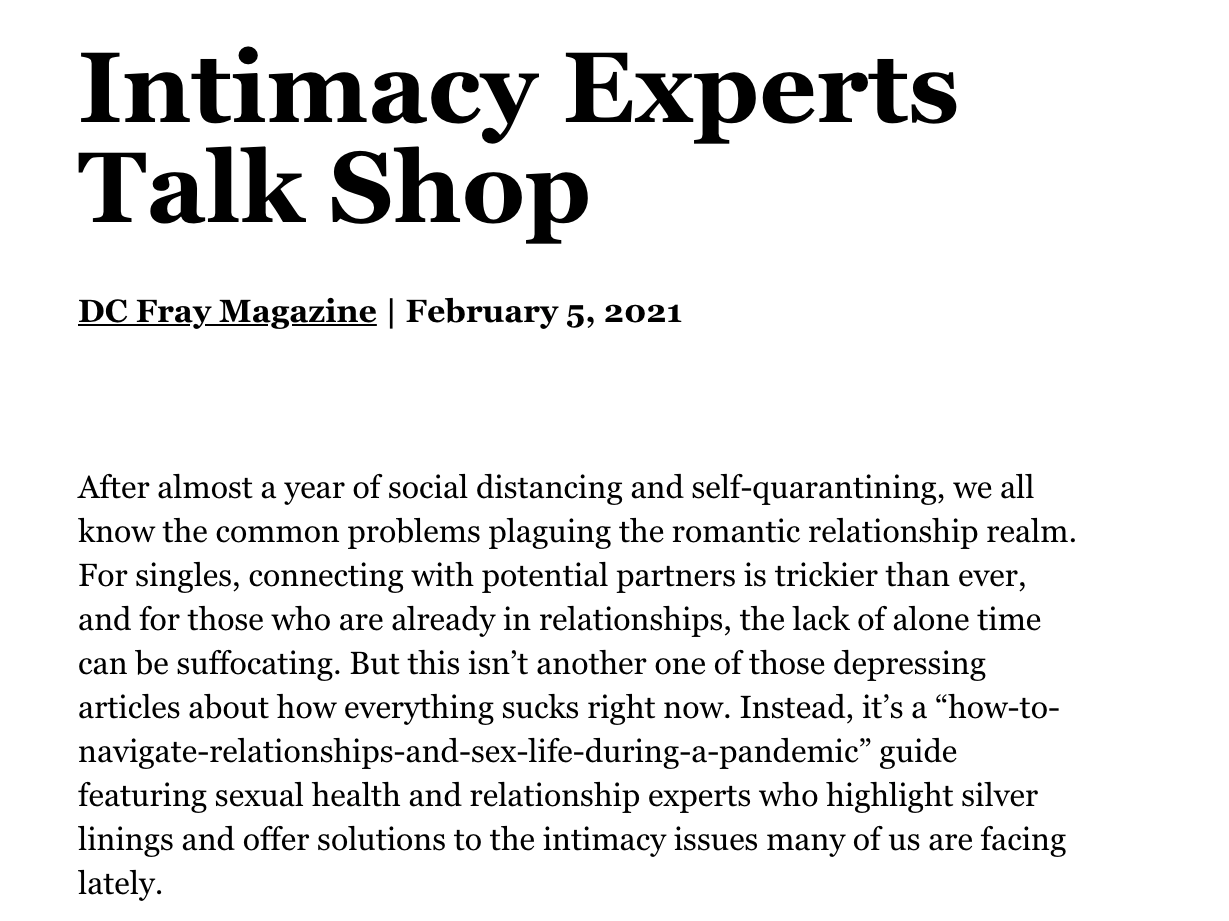Illustration by Amanda Weisbrod
Make Room for
Self-Care in 2021
DC Fray Magazine | January 4, 2021
Self-Care in 2021
DC Fray Magazine | January 4, 2021
Dry January is a familiar New Year’s resolution for many that might feel even tougher to follow after experiencing the dumpster fire of a year that was 2020. But, not drinking a single sip of alcohol for an entire month doesn’t have to be painful. In fact, it’s a good first step to weaving a little bit of self-care into your everyday life, which will boost your mental and physical health in the long run. You can trust me on this one: I’ve been practicing the art of self-care since the beginning of 2020, and it has been a godsend. I challenge you to take your Dry January resolution to the next level by following this accessible 10-step self-care regimen for the rest of the month, and if you’re feeling up for it, the entire year.
1. Make a routine and stick to it
I count on my routine to prepare for my day and wind down at the end of it. I roll out of bed at 7 a.m. each morning, make my bed, brush my teeth, take a shower, then put on a pot of coffee and cook breakfast. At bedtime, I wash the dishes, shower, brush my teeth, make myself a cup of tea, and burrow under a mass of blankets while I journal and read before turning out the lights at 11 p.m. Having little rituals is a great way to ground yourself and keep track of days and nights, especially during the monotony of a pandemic.
2. Practice good sleep hygiene
Adults 18 years and older should get at least seven hours of sleep each night, according to The Center for Disease Control and Prevention. For those who have trouble falling asleep, turn out the lights at the same time each night and don’t hit snooze in the morning. Create the most comfortable atmosphere in your bedroom as possible by sleeping with your favorite pillows and blankets, and making temperature, darkness and quietness levels to your liking. Remove screens (TV, cell phone, tablet) from the bedroom and avoid eating large meals and drinking caffeine before bedtime. And finally, get some exercise during the day to wear yourself out.
3. Make time for your mental health
Stop what you’re doing, take a deep breath and be present with yourself. Note the different sensations you’re feeling in your body, like a clenched jaw or tense shoulders. Take inventory of your emotions and ask yourself why you feel this way. Congrats, you’ve just practiced mindfulness! Checking in with yourself through mindfulness and meditation has many benefits such as reducing stress, improving sleep quality and lowering anxiety levels. Personally, I like to sit in my little armchair and look out of the window in my studio. I sip on a cup of hot spiced tea and reflect on my day, or anything really — the experience is even better when it’s snowing.4. Write in a journal daily
Trending since 2016, bullet journaling is the act of filling a blank page or bullet-style notebook with anything you want: plans, career goals, and thoughts and feelings are a few of the endless possibilities. Think of bullet journaling as a new take on the classic journal, but with much more organization involved. For me, I like to stick to a boring, old, lined notebook. Every night, I write an entry about my day. I let my mind wander and reflect on the events of the past 24 hours, not judging how much I write or how much time I spend writing. Putting my anxieties and concerns on the page gets it out of my head and allows me to fall asleep untroubled and unbothered.5. Keep track of your well-being
I wasn’t familiar with mood tracking until I began my own self-care journey, but I am very happy I discovered it. Each night before I write about my day in my lined notebook, I fill out a chart designed for tracking my mood, anxiety and irritability levels, alcohol consumption, and anything else I deem important. I’ve logged my feelings for each day in 2020, which allowed me to notice trends I wouldn’t have caught otherwise. As a person diagnosed with a mental illness, tracking my mental health helps me recognize trends and warning signs, but I believe mood charting can be beneficial for anyone.
6. Eat healthy, but don't force a diet
Along with not getting enough exercise, my diet turned to crap. But once I began exercising, I took inventory of what I was putting into my body and was not happy with my findings. I started counting my macronutrients, which you might’ve heard bodybuilders or fitness enthusiasts talk about before. The basic idea is your calorie intake each day should include about 45-65% carbohydrates, 20-35% fats and 10-35% protein. This take on eating healthy is better than any other because it isn’t a diet plan. By counting macros, you’re changing your lifestyle and relationship with food for the long-term, not just following a lose-weight-quick scheme, which often leads to yo-yo dieting and weight gain. Still, make sure you include a cheat meal so you don’t burn out! On Friday nights, I celebrate a successful week of exercise and eating right by ordering pizza, wings or whatever my heart desires.
7. Reevaluate your drinking habits
In 2015, the prevalence of binge drinking, or the act of consuming at least four alcoholic beverages on one occasion, among adults in D.C. was at 24.4% – the second highest in the country behind North Dakota, according to the CDC. Studies show that drinking a lot of alcohol has many adverse effects on your physical and mental health, so to get into the habit of self-care, Dry January is a great place to start. Take this month to reflect on how much you drink, why you’re drinking and how drinking makes you feel, then go from there.8. Do things you enjoy without guilt
In my opinion, there’s too much emphasis on being productive in today’s society and not enough attention spent on doing things that we enjoy. We feel anxious and hate ourselves for not working toward some goal or aspiration 24/7 (at least I used to), thus we feel guilty for taking time off to indulge in hobbies. But the truth is, spending time on personal interests allows for a space to declutter your mind so you can get back to work feeling refreshed. My personal hobbies include reading, playing my Nintendo Switch and watching period dramas (looking at you, “Downton Abbey”).
9. Make an effort to stay connected
Seeing your favorite people face-to-face is tricky due to social distancing restrictions, but support networks are more important now than ever due to their positive impact on mental health. Self-isolation can leave you feeling hopeless and alone, and it’s more tempting to do now that we aren’t forced to have social interactions in public. So, take the time to video chat that friend you haven’t spoken to in a while or call up your grandma to say hello. And remember, you are not alone.
10. Work exercise into your routine
I’ll be honest, as soon as the stay-at-home order hit, I sat on my couch for weeks and barely moved. With my daily trek to campus canceled, I suddenly missed out on burning about 300 calories a day and gained 20 pounds over six months. I felt miserable, so I worked up the courage and decided to do something about it. Now I’m hitting the gym three times a week, and I feel so much better for it. I have more energy, I’m happier and I’m even sleeping better — hopefully weight loss follows soon! And if you don’t feel comfortable going to a gym, try exercising at home.
Check out the full graphic version of this story here.
Originally published in DC Fray Magazine.



